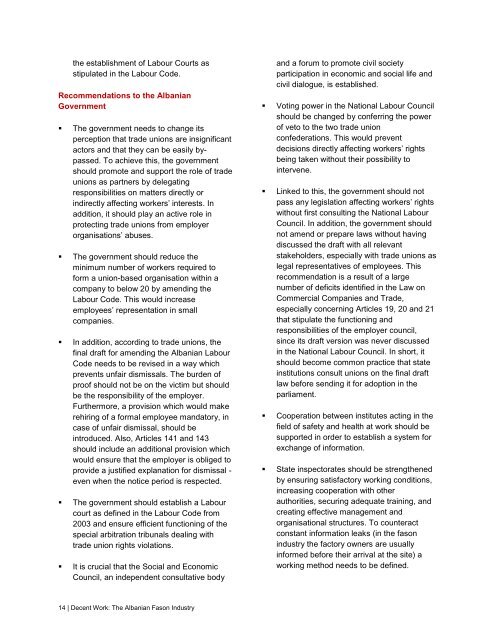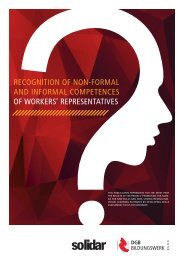The Albanian Fason Industry - Solidar
The Albanian Fason Industry - Solidar
The Albanian Fason Industry - Solidar
You also want an ePaper? Increase the reach of your titles
YUMPU automatically turns print PDFs into web optimized ePapers that Google loves.
the establishment of Labour Courts as<br />
stipulated in the Labour Code.<br />
Recommendations to the <strong>Albanian</strong><br />
Government<br />
• <strong>The</strong> government needs to change its<br />
perception that trade unions are insignificant<br />
actors and that they can be easily bypassed.<br />
To achieve this, the government<br />
should promote and support the role of trade<br />
unions as partners by delegating<br />
responsibilities on matters directly or<br />
indirectly affecting workers’ interests. In<br />
addition, it should play an active role in<br />
protecting trade unions from employer<br />
organisations’ abuses.<br />
• <strong>The</strong> government should reduce the<br />
minimum number of workers required to<br />
form a union-based organisation within a<br />
company to below 20 by amending the<br />
Labour Code. This would increase<br />
employees’ representation in small<br />
companies.<br />
• In addition, according to trade unions, the<br />
final draft for amending the <strong>Albanian</strong> Labour<br />
Code needs to be revised in a way which<br />
prevents unfair dismissals. <strong>The</strong> burden of<br />
proof should not be on the victim but should<br />
be the responsibility of the employer.<br />
Furthermore, a provision which would make<br />
rehiring of a formal employee mandatory, in<br />
case of unfair dismissal, should be<br />
introduced. Also, Articles 141 and 143<br />
should include an additional provision which<br />
would ensure that the employer is obliged to<br />
provide a justified explanation for dismissal -<br />
even when the notice period is respected.<br />
• <strong>The</strong> government should establish a Labour<br />
court as defined in the Labour Code from<br />
2003 and ensure efficient functioning of the<br />
special arbitration tribunals dealing with<br />
trade union rights violations.<br />
• It is crucial that the Social and Economic<br />
Council, an independent consultative body<br />
and a forum to promote civil society<br />
participation in economic and social life and<br />
civil dialogue, is established.<br />
• Voting power in the National Labour Council<br />
should be changed by conferring the power<br />
of veto to the two trade union<br />
confederations. This would prevent<br />
decisions directly affecting workers’ rights<br />
being taken without their possibility to<br />
intervene.<br />
• Linked to this, the government should not<br />
pass any legislation affecting workers’ rights<br />
without first consulting the National Labour<br />
Council. In addition, the government should<br />
not amend or prepare laws without having<br />
discussed the draft with all relevant<br />
stakeholders, especially with trade unions as<br />
legal representatives of employees. This<br />
recommendation is a result of a large<br />
number of deficits identified in the Law on<br />
Commercial Companies and Trade,<br />
especially concerning Articles 19, 20 and 21<br />
that stipulate the functioning and<br />
responsibilities of the employer council,<br />
since its draft version was never discussed<br />
in the National Labour Council. In short, it<br />
should become common practice that state<br />
institutions consult unions on the final draft<br />
law before sending it for adoption in the<br />
parliament.<br />
• Cooperation between institutes acting in the<br />
field of safety and health at work should be<br />
supported in order to establish a system for<br />
exchange of information.<br />
• State inspectorates should be strengthened<br />
by ensuring satisfactory working conditions,<br />
increasing cooperation with other<br />
authorities, securing adequate training, and<br />
creating effective management and<br />
organisational structures. To counteract<br />
constant information leaks (in the fason<br />
industry the factory owners are usually<br />
informed before their arrival at the site) a<br />
working method needs to be defined.<br />
14 | Decent Work: <strong>The</strong> <strong>Albanian</strong> <strong>Fason</strong> <strong>Industry</strong>
















